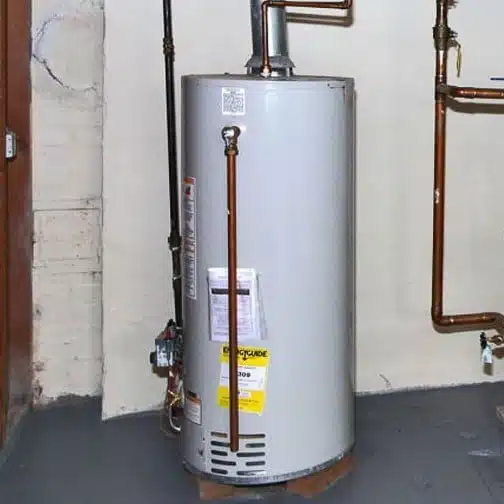heating FAQ
When Should You Repair Your Water Heater?
Short Answer: Your water heater needs repair when it provides insufficient hot water, shows water temperature inconsistencies, makes unusual noises, or leaks. Discolored or foul-smelling water can also indicate a problem that requires repair or possibly replacement of your water heater.

A water heater, although often overlooked, is a central aspect of our daily lives, providing the comfort of hot showers, clean dishes, and sanitised clothing. However, when something goes awry, it can be a significant inconvenience, even turning into a potential safety hazard. This blog post will guide you through the telltale signs your water heater needs attention and how to decide whether to repair or replace it.
Understanding Your Water Heater
First, it’s essential to understand the basic operations of your water heater. Whether it’s a gas or electric model, a water heater functions by heating cold water from a supply pipe and storing it until it’s needed. Regular maintenance can extend the lifespan of your water heater and ensure its optimal functionality, helping you avoid sudden disruptions or costly damage.
Signs Your Water Heater Needs Repair
There are several clear and subtle signs that your water heater might need repair. Here’s a more detailed look into some of them:
- Insufficient Hot Water: This is typically the first and most obvious sign of trouble. If you’re noticing that your hot showers are shorter than usual, or there’s not enough hot water for your needs, your water heater might be struggling. This could be due to a malfunctioning thermostat or a failing heating element.
- Water Temperature Inconsistencies: If your water temperature fluctuates unpredictably during use, this inconsistency could indicate a faulty thermostat, sediment build-up, or another internal issue that’s preventing the water heater from maintaining steady heat.
- Noisy Water Heater: Unusual noises coming from your water heater, like rumbling, cracking, or popping sounds, can indicate a serious issue. These noises often result from sediment build-up in the tank, causing the unit to overwork and potentially leading to more serious damage over time.
- Discolored or Foul-Smelling Water: If your water has a strange color, particularly a rusty hue, or an unusual smell, this can be a sign of corrosion inside the water heater or bacterial infection. This is a health hazard and requires immediate attention.
- Water Leaks: Leaks around your water heater are a clear indication of a problem that can cause significant water damage to your property. A leak could be due to high pressure in the tank, a crack in the tank, or faulty connections.
- Age of Your Water Heater: The average lifespan of a water heater is around 10-15 years. If your heater is within or beyond this range and causing regular problems, it’s time to consider a repair or even a replacement.
Deciding Between Repair and Replacement
When your water heater starts showing signs of distress, it can be difficult to decide whether to repair or replace it. Several factors come into play, such as the severity and frequency of the issues, the age of your unit, and whether it still falls under warranty.
Consider cost-effectiveness too. While repair may seem like the cheaper option initially, frequent repairs can add up, making replacement a more economical choice in the long run. Also, bear in mind the environmental impact. Newer models are often more energy-efficient, reducing your carbon footprint.
However, always consult with a professional before making a final decision. An experienced plumber can accurately diagnose the problem and suggest the most viable solution.
Preventive Measures to Extend Water Heater’s Lifespan
The decision between repairing or replacing your water heater depends on a variety of factors. Here are some key considerations:
- Frequency and Severity of Problems: If your water heater is having occasional minor issues, a simple repair might solve the problem. However, if problems are severe or happening regularly, replacement might be the more reliable and cost-effective solution.
- Age of the Heater: If your water heater is older than 10 years and constantly needs repairs, it might be more economical and energy-efficient to replace it with a newer model.
- Cost-effectiveness: While the initial cost of repair might be less than replacement, frequent repairs can quickly add up. A new unit, although more expensive upfront, could save you money in the long run, especially considering newer models’ energy efficiency.
- Warranty: Check whether your water heater is still under warranty. If it is, you may be able to get repairs or even a replacement at a significantly reduced cost.
Conclusion
Recognizing the signs of a failing water heater is key to avoiding the inconvenience and potential hazards of a breakdown. Although repairs can often fix the problem, sometimes a replacement is the more cost-effective and environmentally-friendly option. Regular maintenance, proper use, and preventive measures can help keep your water heater in good shape for years.
